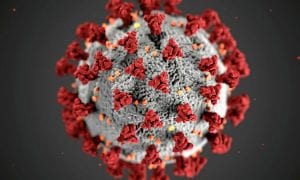
Walmart in Westfield has supplies at the ready for combatting the flu. Shelves were stocked Feb. 26, 2020 with disinfecting spray, wipes, tissues and spray bottles right by the entrance. Disposable face masks and hand sanitizer were also on display. (HOPE E. TREMBLAY/THE WESTFIELD NEWS)
WESTFIELD- After a week of rapidly increasing spread of the novel coronavirus (COVID-19) across the globe, local hospitals are beginning preparations for the possibility of a large increase in patients should the virus spread in Western Massachusetts
Dr. Megan Gallagher, an infectious diseases specialist at Baystate Health, said that the hospitals in the Baystate Health system — including Baystate Noble in Westfield – are receiving protective equipment so that doctors can treat patients they suspect of having the new virus.
“We are preparing to make sure that patients are recognized as patients that are infected when they enter the hospital,” said Gallagher, “We are also making sure that we are protected with the proper equipment.”
Earlier this week, the number of confirmed cases of COVID-19 in the U.S. surpassed 60 after an individual in California tested positive for the virus despite not having the same travel history or obvious contact with an infected person that the other cases have had so far. This makes it the first case in the U.S. in which the infected person cannot trace where they got the virus from, concerning national health officials.
Gallagher acknowledged that the number of cases of COVID-19 may be even higher than the confirmed number, as tests for the virus are not commercially available to local hospitals, and must be received individually through the Centers for Disease Control (CDC).
“The problem with testing is that there is no commercially available test in the United States,” said Gallagher, “Right now we have to call the state Department of Public Health to see if they agree that a test is necessary through the CDC. There is no other way at this time.”
While the number of daily reported new cases has decreased in China, the origin country for the virus, COVID-19 spread quickly in other countries throughout the week. Most notably, it spread in Italy, South Korea, and Iran.
While the virus thus far has shown a relatively low death count, it is considered to be incredibly contagious. It has an incubation period of about three to seven days, though some cases are reported to have had a period as high as 14 days.
Fears of the virus have caused U.S. stocks to fall sharply over the last week.
Gallagher said that the recommendations for people to protect themselves from the virus remain the same as they had in recent weeks.
“The biggest recommendations are for good, aggressive hand washing, staying home when you’re sick, covering your mouth when you cough or sneeze and getting checked out when you think you have a respiratory virus,” said Gallagher. “It’s a lot of the same sort of precautions I would give to someone for the flu.”
While the spread within the U.S. has remained largely contained, CDC officials expect that the worst may be yet to come.
“To date, our containment strategies have been largely successful and as a result, we have very few cases in the United States, and no spread in the community,” said Nancy Messonnier, director of the National Center for Immunization and Respiratory Diseases with the CDC, “But as more and more countries experience community spread, successful containment at our borders becomes harder and harder. Ultimately, we expect we will see community spread in this country. It is not so much a question of if this will happen anymore, but more of a question of when.”






